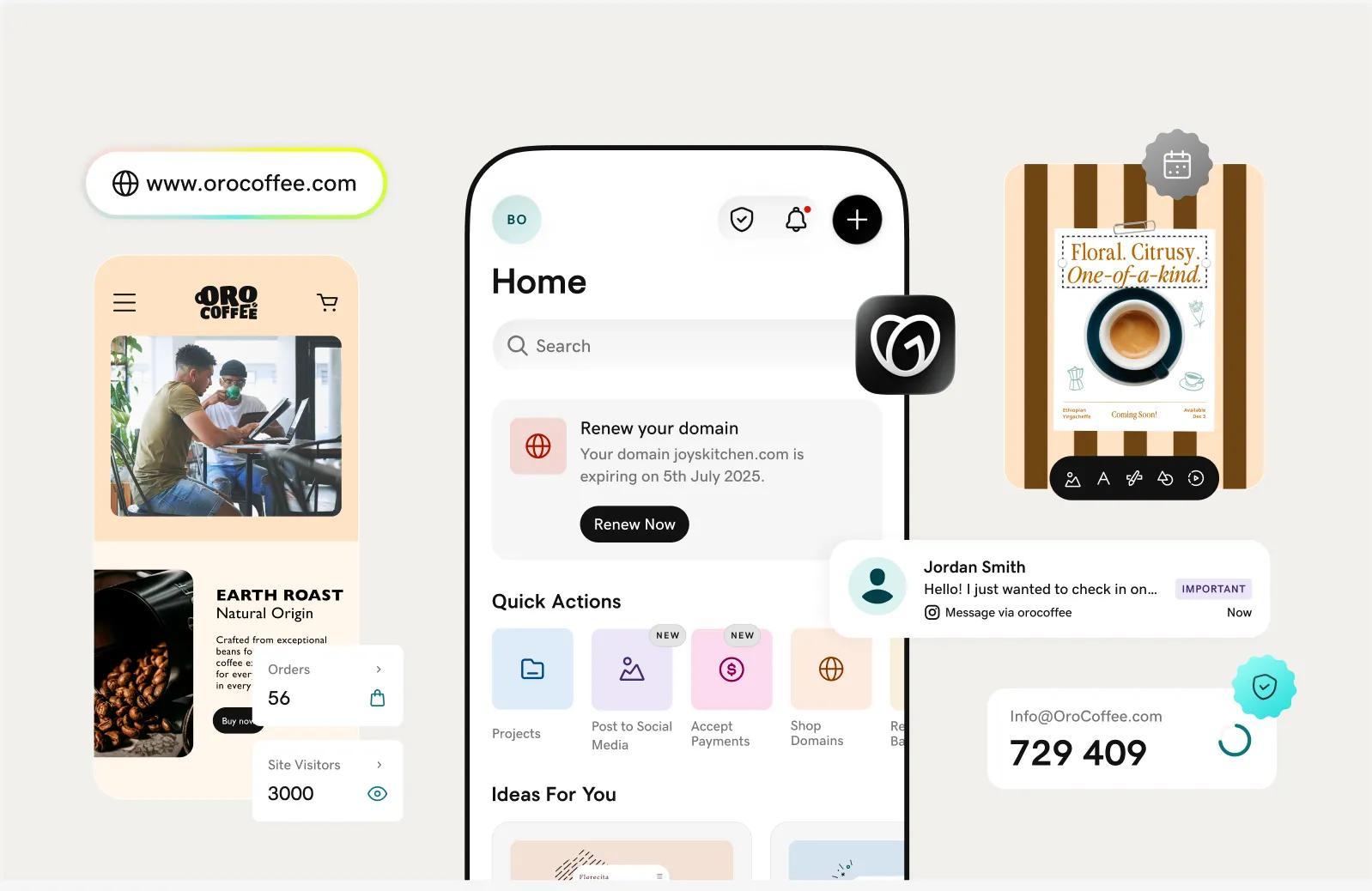In today’s truly distributed world, solopreneurship is an increasingly viable path to take for many. For would-be entrepreneurs, becoming a solopreneur is a path to a more fulfilling life in terms of flexibility, freedom and control over your own destiny.
However, it’s not all rainbows and unicorns.
The reality is that being a solopreneur means learning how to survive in what can be an incredibly challenging environment. Making a go as a solo entrepreneur involves gracefully clearing a series of tricky hurdles without falling hard along the way.
Editor's note: A website is an important tool for any solopreneur. Ready to get yours started? Websites + Marketing is here to help.
10 steps to become a solopreneur
In this piece, we’ll explain what a solopreneur is and look at the key steps, within three overarching stages, that solopreneurs have to go through in order to thrive over the long-term.
- Settle on a business idea.
- Do your research.
- Give it a name.
- Practice and test your idea.
- Establish a budget.
- Start building your brand.
- Create an online presence.
- Network with others.
- Consider automation.
- Remember your limits.
Let’s dive in!
What is a solopreneur?
A solopreneur is essentially a blend of two words: solo and entrepreneur. The term is used to describe someone who owns and runs their business without any employees.
According to the Merriam-Webster dictionary, a solopreneur is:
“One who organizes, manages, and assumes the risks of a business or enterprise without the help of a partner: a solo entrepreneur.”
While solopreneurs run their business alone, they do sometimes hire contractors or outsource certain tasks. This helps them free up their time from tasks outside their areas of interest or competency so they can focus on tasks that will help them grow or scale their business further.
Solopreneurship is a great choice for designers, copywriters, coaches, consultants, artists, illustrators and any other service provider who works with clients one-on-one. But, you can also be a solopreneur if you sell handmade goods and products that aren’t mass-produced.
Now that we’ve established what a solopreneur is, let’s go over the steps you’ll likely go through to join the ranks of solopreneurs.
Related: Navigating the four stages of the entrepreneur journey
Stage 1: Achieving liftoff

The very first stage on your road to becoming a solopreneur is achieving liftoff.
‘Wantrepreneurs’ are legion, the amount of people who actually muster up the gumption to get something off the ground is substantially smaller.
To be fair, actually achieving liftoff is no trivial task.
Most people don’t have the luxury of background funding in order to ease into their new reality. For the majority, it’s a question of working double-time alongside an existing gig until the numbers start adding up.
Once you do actually scrape together enough short-term cash, you’re still facing a terrifying leap into the unknown when you decide to actually go for it full-time.
In our roundup of key stages for solopreneurs, achieving liftoff can take a surprising amount of guts, grit and time.
If you’re in it, keep pushing. If you’re teetering on the edge of it, marshall your forces and prepare to step into a brave new world.
In this stage, you should settle on a business idea, validate it, name it, start testing it, and make a budget that will help you survive once you’re ready to go all in.
Related: How to start a consulting business on a $0 budget
1. Settle on a business idea
Your journey to becoming a solopreneur starts with a solid business idea.
However, it’s not enough to simply have an idea.
Your business idea should be based on something you’re passionate about and can see yourself doing day in and day out for the foreseeable future.
But, it also needs to be in demand, otherwise, your passion for it won’t help you achieve success.
Combine passion with demand and you have a profitable business idea that will help you launch a business that’s not only successful but it makes you excited to start your day.
Related: 25 home business ideas with low startup costs
2. Do your research
Once you know your business scope, research your business field so you can have a realistic idea of what it will take to be successful.
In particular, you’ll want to pay attention to how others in your field position their offers, how they promote them, and which platforms they are most active on.
The goal of this research is not to copy them but to give you a general idea of what’s involved in running a similar business as well as identify any potential gaps in the market that you could fill.
This step will also help you figure out your limits and narrow down what you can and cannot do.
Related: How to find inspiration from your competitors (without stealing their ideas)
This is also the time to figure out your target audience. You can’t (and don’t want to) be all things to all people.
Getting specific about the audience you hope to serve will result in much more effective marketing and business operations.
Devote some time to defining the characteristics shared by your ideal customers, including:
- Demographics
- Professional details
- Personality traits
- Goals
- Pain points / Challenges
- Buying process
With this information in hand, you can begin to develop detailed customer personas.
3. Give it a name
For many solopreneurs, this is the step when the idea really starts to take shape.
Putting a name to your idea gives it wings.
You probably got some ideas while you were doing your research. Now, brainstorm more possible names for your new venture.
Be sure to check the availability of the corresponding domain name as you narrow down your list.
When you’ve finally settled on a name (and this might take a bit of time — as it should, because it’s important), register the domain.
Related: Find out how to register a domain URL in 3 steps
Then, get a professional email address attached to your domain. This will lend credibility to your new venture as you continue along your journey to becoming a bonafide solopreneur.
Related: Resources for naming a business
4. Practice and test your idea

Plan an hour a day to work on your business and grow from there.
A detox from low-value activities is a good idea in this phase.
Forego mindlessly browsing social media, binge-watching Netflix or any other activity that won’t move the needle in your business.
Instead, trade these low-value activities for being productive to grow your independent venture.
5. Establish a budget
The last step in this stage is to figure out what products, services, tools and other expenses you’ll need for your business. Then define your budget.
As a general rule of thumb, you’ll want to save at least six months’ worth of living expenses before you take your business idea full time.
Related: How to begin budgeting for a new product or service
Stage 2: Presence creation and networking
Congratulations! You’re now at Stage Two, which involves starting to build your brand, establishing an online presence, and networking with others in your field.
6. Start building your brand
As Chris Carfi wrote in the "Create It" post within his Entrepreneur Journey series:
“Your brand connects the core of what you’re promising to deliver to your customers to a set of triggers that remind the customer of that promise.”
Once you figure out the personality you want your brand to embody and the kind of experience you want your customers to have when they interact with you, you can begin to develop the visual assets that will represent your brand promise.
These include:
- Your logo
- Your brand colors
- Your fonts
You also might consider creating a brand style guide to pull it all together.
Related: Resources for building a brand
7. Create an online presence
This stage is the perfect time to establish your online presence. You’ve already got a domain and professional email. You’ve developed the visual assets that represent your brand. Now, it’s time to build a website that will help you share what you do, who you do it for, and how you do it.
Depending on the type of business you’re trying to build, a portfolio site might be useful to showcase your past projects. This includes graphic designers, web designers, copywriters, illustrators, artists and any other creative business niche.
GoDaddy’s Websites + Marketing solution might be an excellent DIY choice here.

With designer templates for entrepreneurs in a variety of industries, Websites + Marketing offers features including:
- The ability to manage your website plus integrated marketing tools all in one place
- GoDaddy InSight — Data-driven suggestions and tailored action plans to help you keep improving your website and marketing efforts
- Customizable website themes — making it a snap to instantly change layouts, fonts and colors
- Built-in SSL certificate
- Responsive design
- Fast and reliable hosting
- 24/7 customer support
Related: Introducing GoDaddy Websites + Marketing
Finally, don’t forget to register social handles that reflect your brand and business name.
All of the above will help you position yourself as a professional and help you build trust with potential clients and customers.
8. Network with others
One of the best ways to put yourself on the radar of potential clients is to network with others.
According to a study by the Economist Intelligence Unit, networking is vital to entrepreneurial success for 78% of startups.
Attend conferences and conventions for your chosen business field and consider joining professional groups or organizations in your area.
Even if you’re working alone, having a strong network can be a big help.
Others can refer new clients to you if they are too busy or if a client is not a good fit for them. Not to mention networking can often lead to collaborations that can put you in front of a new audience.
Related: Networking for women — How to work your network for leads and clients
Stage 3: Consolidation and organization

By this stage, you’re likely seeing the light at the end of the tunnel. You’ve been hustling to get out of survival mode and have achieved some sort of cruising altitude.
You’ve got reliable cash flow coming in, a stable customer or client base, and a pretty solid picture of what the next three to six months look like. It’s an enormous relief to make it to this point, but the hard work isn’t over!
In the struggle to get this far on your own, it’s likely that you’ve built up all manner of what our developer friends would call “technical debt” along the way. This is a fancy way of saying that corners have inevitably been cut somewhere.
At some stage you’re going to have to deal with the consequences — this is that stage.
The first stages of becoming an entrepreneur are essentially successive sprints, but nobody can sprint forever — which means it’s time for the next step.
9. Consider automation
This stage is where you start settling in for an actual marathon. It’s all about getting your ducks in a row and nailing down proper systems and procedures to radically improve your profits and productivity.
Introducing automation into your business can free you up from the minutiae of day-to-day operations.
Automating certain processes can increase your productivity by freeing up between two and three work hours per day.
This can include:
- Setting up budgeting and/or accounting software
- Setting up auto-deposits with your bank
- Using social media bots
- Developing email drip campaigns with autoresponders
Tools like Zapier, IFTTT, Automate.io and others can connect various tools and apps you’re using in your business and handle a lot of the administrative tasks for you.
You can use them to automatically sync your invoices with your accounting software, send out a contract to sign to new clients, create a record of your blog posts in a spreadsheet, and more.
Related: Marketing automation — Guide to getting started with a marketing automation system
10. Remember your limits
The most important thing to keep in mind is your limits. Remember that trying to do or be everything will lead to burnout.
Don’t be afraid to set boundaries.
Focus on one important decision: Do I hire or outsource?
For most solopreneurs at this stage of the game, outsourcing specific projects or tasks is the way to go. This frees you up to refocus your time on activities that will help you grow and scale your venture while saving the costs associated with hiring in-house employees.
Look into hiring a virtual assistant, and seek strategic partnership opportunities within your network.
It’s all about discovering your personal limits, and working out how to elegantly transcend them with the help of others.
It’s a great place to be. Get this far and down the line, the world’s your oyster!
Related: 3 tips for solopreneurs to avoid burnout
Take the next step and join the solopreneur ranks
Being a solopreneur is far from an easy path to take, but it offers outsized rewards for those who can handle the demands involved. Navigate your way through the key stages we’ve outlined, and you’ll join a select group of individuals who are truly in control of their own working world.
Let’s briefly recap those key steps again:
- Choose a business idea you’re passionate about and define your business scope.
- Conduct competitive research and identify your target audience.
- Give your venture a name that represents your offerings, and be sure to register the corresponding domain name.
- Validate and test your idea so you know what it will take to become successful.
- Start small, reduce or eliminate low-value activities, and set a budget to keep you afloat.
- Work on building your brand, including your logo and other visual assets. For the logo, you can use our free logo maker.
- Create an online presence. This includes building an effective website and claiming your social media handles.
- Establish a network to build momentum and get clients
- Consolidate your position and get super-organized, with the help of automation, once you’re over the initial hump.
- Consider how to scale once you hit the limits of your personal capacity.
Are you ready to climb this particular mountain? Set yourself up for solopreneur success with a website and built-in marketing tools that showcase all you have to offer.
This article includes content originally published on the GoDaddy blog by Tom Ewer.









